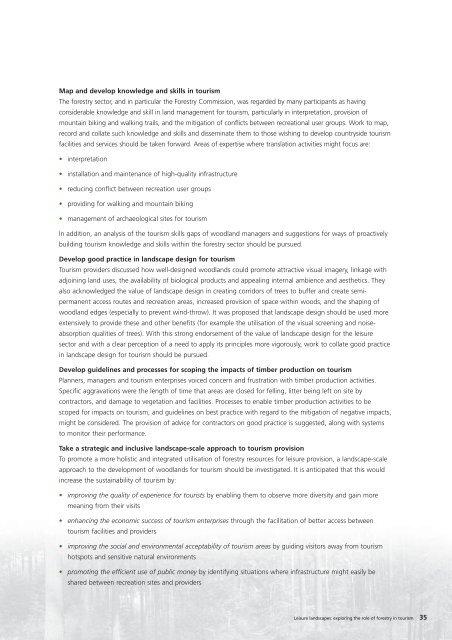Leisure Landscapes
Leisure Landscapes has been providing professional landscaping in Durham NC since 1993. Our landscapers serve Raleigh, Cary, Chapel Hill, Apex and Wake Forest. Our landscaping design services include installation, irrigation and maintenance.
Leisure Landscapes has been providing professional landscaping in Durham NC since 1993. Our landscapers serve Raleigh, Cary, Chapel Hill, Apex and Wake Forest. Our landscaping design services include installation, irrigation and maintenance.
Create successful ePaper yourself
Turn your PDF publications into a flip-book with our unique Google optimized e-Paper software.
Map and develop knowledge and skills in tourism<br />
The forestry sector, and in particular the Forestry Commission, was regarded by many participants as having<br />
considerable knowledge and skill in land management for tourism, particularly in interpretation, provision of<br />
mountain biking and walking trails, and the mitigation of conflicts between recreational user groups. Work to map,<br />
record and collate such knowledge and skills and disseminate them to those wishing to develop countryside tourism<br />
facilities and services should be taken forward. Areas of expertise where translation activities might focus are:<br />
• interpretation<br />
• installation and maintenance of high-quality infrastructure<br />
• reducing conflict between recreation user groups<br />
• providing for walking and mountain biking<br />
• management of archaeological sites for tourism<br />
In addition, an analysis of the tourism skills gaps of woodland managers and suggestions for ways of proactively<br />
building tourism knowledge and skills within the forestry sector should be pursued.<br />
Develop good practice in landscape design for tourism<br />
Tourism providers discussed how well-designed woodlands could promote attractive visual imagery, linkage with<br />
adjoining land uses, the availability of biological products and appealing internal ambience and aesthetics. They<br />
also acknowledged the value of landscape design in creating corridors of trees to buffer and create semipermanent<br />
access routes and recreation areas, increased provision of space within woods, and the shaping of<br />
woodland edges (especially to prevent wind-throw). It was proposed that landscape design should be used more<br />
extensively to provide these and other benefits (for example the utilisation of the visual screening and noiseabsorption<br />
qualities of trees). With this strong endorsement of the value of landscape design for the leisure<br />
sector and with a clear perception of a need to apply its principles more vigorously, work to collate good practice<br />
in landscape design for tourism should be pursued.<br />
Develop guidelines and processes for scoping the impacts of timber production on tourism<br />
Planners, managers and tourism enterprises voiced concern and frustration with timber production activities.<br />
Specific aggravations were the length of time that areas are closed for felling, litter being left on site by<br />
contractors, and damage to vegetation and facilities. Processes to enable timber production activities to be<br />
scoped for impacts on tourism, and guidelines on best practice with regard to the mitigation of negative impacts,<br />
might be considered. The provision of advice for contractors on good practice is suggested, along with systems<br />
to monitor their performance.<br />
Take a strategic and inclusive landscape-scale approach to tourism provision<br />
To promote a more holistic and integrated utilisation of forestry resources for leisure provision, a landscape-scale<br />
approach to the development of woodlands for tourism should be investigated. It is anticipated that this would<br />
increase the sustainability of tourism by:<br />
• improving the quality of experience for tourists by enabling them to observe more diversity and gain more<br />
meaning from their visits<br />
• enhancing the economic success of tourism enterprises through the facilitation of better access between<br />
tourism facilities and providers<br />
• improving the social and environmental acceptability of tourism areas by guiding visitors away from tourism<br />
hotspots and sensitive natural environments<br />
• promoting the efficient use of public money by identifying situations where infrastructure might easily be<br />
shared between recreation sites and providers<br />
<strong>Leisure</strong> landscapes: exploring the role of forestry in tourism<br />
35


